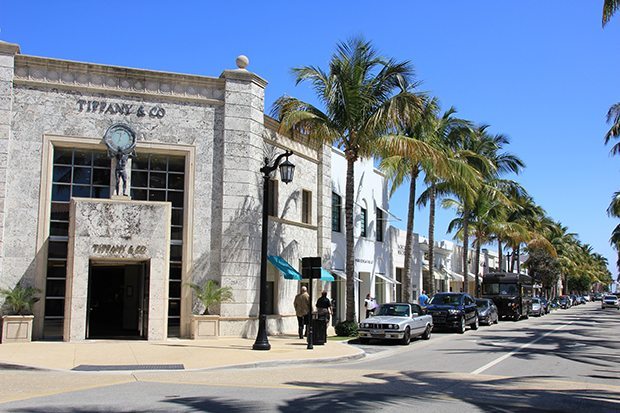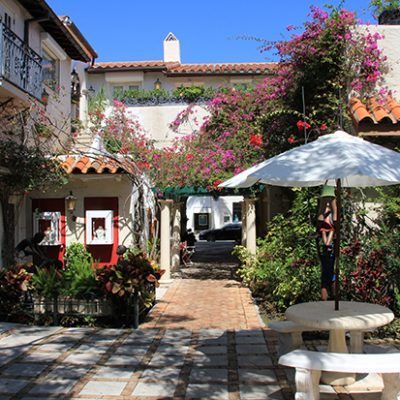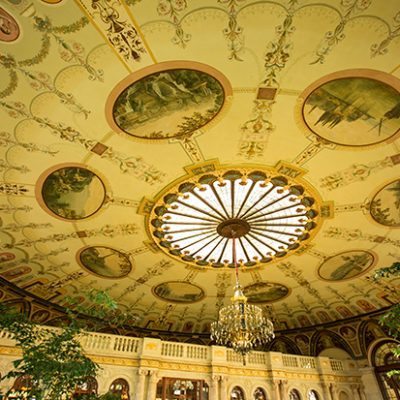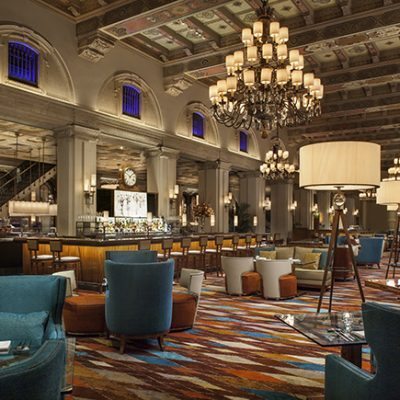
Palm Beach is the jewel in the crown of Florida’s lower east coast, where countless experiential gems can be mined, from Jupiter to Miami
by Laura D.C. Kolnoski
High times during high season are being celebrated through March in the toniest towns along Florida’s southern Atlantic coastline, where the rich and famous are ensconced in gracious mansions and luxurious resorts waiting out the winter months. Beach pursuits, dining, boating, fishing, golfing, and generally living large are the norm in this upscale tropical paradise between the Atlantic Ocean and Intracoastal Waterway. Shopping is elevated to an art form along famed Worth Avenue in Palm Beach—Florida’s answer to Manhattan’s 5th Avenue and Beverly Hills’ Rodeo Drive. The one-of-a-kind award-winning boulevard is rife with courtyards, Gothic arches, Florida flora, and enchanting European old world charm.
Rare treasures await discovery behind doors bearing such elite names as Gucci, Chanel, Giorgio Armani, Louis Vuitton, Tiffany, and Valentino. Princeton’s Hamilton Jewelers has a regal location there. Towering majestic palms line the sidewalks leading from Lake Worth to the landmark clock tower framing the crystal blue ocean, a favorite photo spot for tourists and wedding parties. Nearby, the Saks Fifth Avenue has an exterior living wall covered in natural greenery; a tourist attraction in itself. An elegant open air galleria-style mall, 150 Worth (formerly The Esplanade), offers its own variety of upscale shops and dining options.
Vanderbilts and Kennedys have strolled the iconic shopping district and ducked into its famed cozy bars and renowned eateries. Parking spaces are often occupied by Bentleys, Rolls Royces, and shiny exotic convertibles. In season, calendars fill with charity balls and lavish parties.
“Worth Avenue is unique among luxury retail destinations, not only for its historical significance, but for its adherence to regulations preventing any construction or tenant improvements from November through April,” said Robin Miller, general manager of the Worth Avenue Association. “This ensures no disruptions that could negatively impact the visitor experience.”
The Vias of Worth Avenue
Steeped in a century of Florida lore, Worth Avenue holds another distinctive treasure trove. When visitors discover the Vias of Worth Avenue for the first time, mouths drop, cameras emerge, and plans to go elsewhere are quickly abandoned. Amidst the retail establishments, floral adorned archways bearing the name of each (Via Parigi, Via Mizner, Via Roma, Via Demario, Via Bice, Via Mario, Via Amore, Via Encantada, Via Flora, Via Amore, Via De Lela, and Via Maria) lead to open-air courtyards reminiscent of Mediterranean villages.
Each is different, but all share similar aspects—stunning and whimsical sculptures, colorful tile work, mysterious and elegant staircases, profuse flowers, fountains, and water features. Some have enchanting indoor-outdoor dining options; most have private residences above. Via Mizner and Via Parigi are named for Worth Avenue’s original developers, noted architect Addison Mizner and Paris Singer, heir to the Singer sewing machine company.
A colorful character, the late Mizner is so famous (and infamous) in the Palm Beach area that tributes to him are plentiful. He arrived in southern Florida circa 1918 and is credited with creating Palm Beach’s unique Mediterranean Revival look. Before he set to creating the Vias in the 1920s, he designed the acclaimed Everglades Club. Mizner was known as a social architect, responsible for not only creating the area’s architectural ambiance, but contributing to its high-society character, transforming Palm Beach into an American Riviera.
A bon vivant and raconteur, Mizner built a Palm Beach home for the Wanamaker family (of Philadelphia department store fame) that later became the Kennedy compound. The house he designed for himself was bought by the Vanderbilts and was eventually owned by John Lennon. Worth Avenue itself was born after Singer reportedly bought an alligator tourist attraction and had Mizner create an upscale shopping mecca there for the rich, who were flocking down from the north. Mizner entertained illustrious guests, including George Gershwin and Irving Berlin, who he claimed composed hits on his piano while a butler served cocktails in antique silver mugs. Almost as notorious was Mizner’s pet monkey Johnnie Brown, immortalized on the iron gates of Mizner’s abode above Via Mizner. (Palm Beach’s only cemetery is in Via Mizner, where Johnnie Brown is buried.)
“Mizner’s vision was to replicate the feeling of Venice,” Miller said of the Vias. “These magnificent gems feel like another country, with the historical features of an old-world environment. Amid the Vias’ shops, boutiques, and restaurants, one can find art galleries, blown art glass collections, fine jewelers, specialty shops, and more. The residences above are in high demand and tend not to change hands very often.” Mizner’s design of business/retail below and residential above, ideal for pedestrians and “civilized commerce” proved visionary.
“It is interesting that today’s developers are returning to mixed-use environments in urban areas,” Miller noted. “Mizner was able to envision that need and accommodate it long before it was popular.” Also known as a fine draftsman and watercolor artist, Mizner died in 1933.
Palm Beach Highlights
This February, the popular “Italian Week Palm Beach—Worth Avenue Edition” returns after a long hiatus. Miller promises “…a very special event honoring all things Italian for an entire week on the avenue.” Travelers seeking the ultimate in luxurious award-winning resort accommodations can opt for the grandeur of The Breakers, the Brazilian Court Hotel & Beach Club, the Chesterfield, the Four Seasons, the Eau Palm, or the Omphoy, just for starters. Each has luxe spas, epicurean cuisine, trendy atmospheric bars, and a plethora of amenities.
Any time of year, popular walking tours are conducted by knowledgeable local historians. Annual events include the Cavallino Classic at the Palm Beach International Raceway, a six-day convention of elite automotive enthusiasts; the Jewelry, Art & Antique Show at Palm Beach Convention Center with over 200 exhibitors; a Fine Craft Show showcasing over 125 artists; the International Boat Show in March; and the Sunfest in Spring—an annual festival of music, arts, and food on the waterfront.
Hit the Road
This segment of Sunshine State coastline is ideal for exploration via car. With the ocean on one side and the Intracoastal on the other, tropical eye candy abounds. Anyone can stop and enjoy passive and active recreational opportunities in a multitude of parks and trails dripping with vibrant native floral splendor. Surfing beaches are presided over by soaring and diving pelicans.
To the north, Jupiter is a fabulous destination. Boat tours of elite Jupiter Island (populated by the famous, past and present) are available on the aptly named Manatee Queen. Guides recite fascinating facts and anecdotes about the island’s genesis and notable inhabitants while passengers leisurely float past notable locales, including the bar where Jimmy Buffett and Alan Jackson filmed their “Five O’Clock Somewhere” video, along with the historic lighthouse/museum. Heading south, Highway A1A is lined with eye-popping mansions hiding behind ornate gates and lush landscaping. How long you linger depends on where else you want to go. For a retro trip to the Old Florida of the 50s and 60s, stop in walkable Delray Beach, “Florida’s Village by the Sea” which has evolved into an artists’ colony and hub of dining, shopping, live entertainment, and culture. Declared the “Most Fun Small Town in America” by Rand McNally, there’s always something going on in Delray’s Pineapple Grove Arts District. Continuing south, the posh residences of Boca Raton, surfer enclave of Deerfield Beach, and wonders of Fort Lauderdale await, with plenty of tempting waterside restaurants along the way.
It takes about an hour non-stop to motor south from the Palm Beaches to the Seminole Hard Rock Casino in Hollywood, which is worth the trip even for non gamblers. A substantial entertainment “village” arranged around a lake surrounds the casino, offering enough shopping, dining, alfresco imbibing, and attractions to fill several hours. The hotel pool with a man-made beach is a sight to behold; often populated by the top acts performing there.
For locals, snowbirds, and short-term tourists alike, art and historical museums, sculpture and horticultural gardens, artsvenues, symphonies, zoos, and archetypally Sunshine State attractions await, all with that incomparable laid-back vibe.










